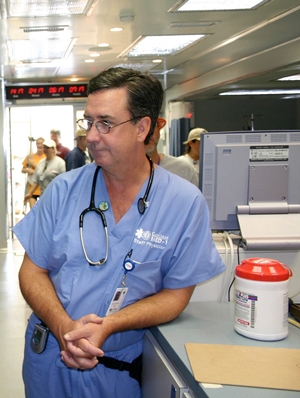Four emergency physicians from Carolinas HealthCare System are in Nepal, providing care following the devastating earthquake. We will provide updates as they come.
The physicians –
Nilesh Patel,
Lee Garvey and Terez Malka of the Emergency Medicine faculty at
Carolinas Medical Center and
Sapana Adhikari, a Nepalese-American emergency physician at
Carolinas Medical Center-Mercy – have joined
Team Rubicon, a volunteer rescue organization founded by two retired U.S. Marines. Team Rubicon's mission is to unite the skills and experiences of military veterans with first responders to rapidly deploy emergency response teams where needed.
Dr. Garvey is a member of the Carolinas MED-1 team mobile emergency hospital unit and has responded three times to domestic disasters. He agreed to send what information he could – though terrain is rough and internet and cell-phone connectivity is spotty – so that others can connect to the people of Nepal and this important mission that's underway. Team Rubicon is also helping to provide photos and information.

Lee Garvey, MD, is an emergency medicine physician at Carolinas Medical Center who is in Nepal with three other Carolinas HealthCare Physicians aiding Team Rubicon with rescue efforts.
Below is a first-person account of Dr. Garvey's first days in Nepal:
April 30:
"Landed successfully in Kathmandu about 7 a.m. local time Thursday. Long way here: Charlotte to Los Angeles to Istanbul to Kathmandu. Other team members are out scouting today. We will likely work in smaller villages out of the city. Our Internet communications are sketchy right now. May have more access soon or may not. I'm at a cafe with Wi-Fi right now. Give me a day or two to see where we go and what we do. I'll definitely keep a log or journal if you will. Short and pithy rather than long and flowery that's for sure.
"The Team Rubicon guys are great. Well-staffed and equipped, very motivated. We may move to a village for a few days so would be out of touch for stretches. Will let you know as plans come together."
May 3:
"Not much connectivity where we are. In a valley 95 km NE of Kathmandu. Saw about 125 patients yesterday at our site, including 25 seen by a team out hiking over a couple ridges. May move further NE tomorrow."
May 4 (1st message):
"Our team went to about half dozen villages in this area (of NE Nepal). Furthest was about 2.5 hour hike. Rakse and Kanabash and Sanaa Hadi are some of them. We are going back to Kathmandu now... Monday morning (Nepal time) to learn our next assignment."
May 4 (2nd message):
"I'm back in Kathmandu, but only briefly – my group is leaving again at 05:30 (Tuesday) on our next assignment. We will be going with the Nepali national police to an area with a huge landslide up Northeast in the country. Not sure of the name of the area, fairly close to Tibet, I think. We are taking a medical team and a UAV (unmanned aerial vehicle or drone) team with helicopter drones.
"Team Rubicon has a drone partner here, HaloDrop. They have visual, infrared, and heat sensing tools on small drones to search for survivors or deceased. Our med team will tend to locals with fallout from the quake. One of my Charlotte EM partners and I will go with 2 former military medics and a translator as the med team.
"Once we are on site, I expect we will have very limited cell connectivity."

Carolinas Medical Centery-Mercy emergency physician Sapana Adhikari, left, logs notes on dozens of patients seeking care outside Kathmandu. Team Rubicon continues to identify outlying areas impacted by the quake that have yet to receive aid. (Photo Credit: Team Rubicon)
 Lee Garvey, MD, is an emergency medicine physician at Carolinas Medical Center who is in Nepal with three other Carolinas HealthCare Physicians aiding Team Rubicon with rescue efforts.
Lee Garvey, MD, is an emergency medicine physician at Carolinas Medical Center who is in Nepal with three other Carolinas HealthCare Physicians aiding Team Rubicon with rescue efforts.



